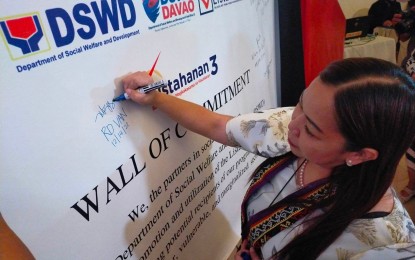
COMMITMENT WALL. Department of Social Welfare and Development in Davao Region Director Vanessa Goc-ong leads the signing of the commitment wall on Wednesday (Dec. 14, 2022), for the proper utilization of the Listahanan database. The database for poor households is used by government agencies and organizations that deliver social protection programs and services. (PNA photo by Robinson Niñal Jr.)
DAVAO CITY – The Department of Social Welfare and Development in the Davao Region (DSWD-11) has identified 332,300 households in the area as poor.
The assessment came after DSWD-11 launched Wednesday the Listahanan, also known as the National Household Targeting System for Poverty Reduction (NHTS-PR), for the region.
Kareen Maris Ferrer, the DSWD11 regional field coordinator for NHTS-PR, said Listahanan is an information management system that identifies who and where the poor are nationwide.
The system is made available to national government agencies and other social protection stakeholders a database of poor households as a basis for identifying potential beneficiaries of their social protection programs and services.
“This is our basis in assisting the needy,” Ferrer said in a press briefing.
Of the total poor households in the region, 47,387 are in the city, Davao de Oro (69,000), Davao del Norte (58,641), Davao del Sur (40,322), Davao Occidental (45,489) and Davao Oriental (71,461).
Meanwhile, DSWD-11 Director Vanessa Goc-ong said the Listahanan will also formulate a uniform set of criteria for identifying poor families in the country through scientific means.
Goc-ong said this would maximize the benefits of social protection programs by developing evidenced-based services for the poor, minimizing the wastage of resources by ensuring only those identified benefit from social protection programs.
“This was conducted in 2019 and the pandemic set in, so the levels of the status of the poor changed. Those who were determined non-poor slid back to survival mode due to the pandemic," she said.
The database for poor households is used by government agencies and organizations that deliver social protection programs and services. (PNA)
